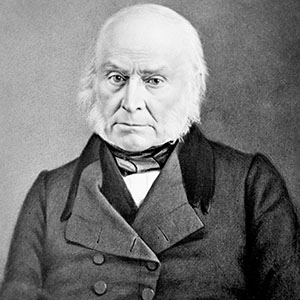John Quincy Adams was the sixth president of the United States from 1825-1829. He was known for being the first president who was the son of a former president, as well as his diplomatic endeavors including negotiating the Treaty of Ghent and the acquisition of Florida.
Early Life
John Quincy Adams was born in 1767 in Braintree (now Quincy) Massachusetts to former president, John Adams, and his wife, Abigail Adams. Adams was a child of the American Revolution; he watched the Battle of Bunker Hill from his farm. Due to his father’s position in government, Adams traveled to Paris with his father. He studied in a private school in Paris in 1778-79 and then at the University of Leiden in the Netherlands in 1780. It was during this time that Adams became fluent in seven languages.
Adams returned to Massachusetts in 1785 and started attending Harvard College. He graduated from Harvard two years later and entered the legal profession in 1790.
Political Career
Adams’ political career stemmed from his experience in diplomacy. His first diplomatic position was in 1794 when President George Washington appointed him as U.S. Minister to the Netherlands. Once his father became president, Adams was appointed as the Minister of Prussia.
Adams returned to Massachusetts in 1801 to reopen his law practice. In 1802, he was elected into the Massachusetts State Senate and shortly thereafter was appointed to serve in the U.S. Senate. Upset by Federalist opposition, Adams resigned from his senate seat in 1808 and went on to become a professor at Harvard.
He was only a professor for one year when President James Madison appointed him as Ambassador to the Russian Court, in which he started cultivating ties with both Russia and France. Using his diplomatic relationships, Adams was able to negotiate the Treaty of Ghent, which subsequently ended the War of 1812.
Under James Monroe’s administration, Adams was appointed Secretary of State. While in this position, Adams was a leader in the acquisition of Florida and the Treaty of 1818 with Great Britain. He was also responsible for the Monroe Doctrine’s success in 1823.
Presidency
Adams became the sixth president of the nation following a highly competitive race. He only served one term and his policies rarely made it past the House because of Jacksonian supporters. Among his policies that never came to fruition were a national program providing federal funding of an interstate system of roads and canals and the creation of a national university. Following his failure to win a second term, Adams retired to Massachusetts where he was elected to the House of Representatives in 1930. As a member, he was an opponent of slavery and promoted the creation of free states. Adams served in the House until his death in 1848.








